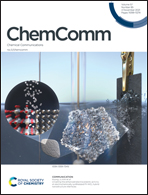Zinc catalysed C3–H borylation of indoles and 1,1-diboration of terminal alkynes†
Abstract
A low catalyst loading Zn(OTf)2-catalysed C3–H borylation of indoles with pinacolborane was developed. This transformation represents the use of an abundant, cheap and environmentally benign zinc catalyst in catalytic direct aromatic C–H borylation and offers a simple and prompt route towards the synthesis of C3-borylated indoles. The 1,1-diboration of terminal alkynes was also achieved using the same catalytic system to produce 1,1-diborylated alkenes.



 Please wait while we load your content...
Please wait while we load your content...